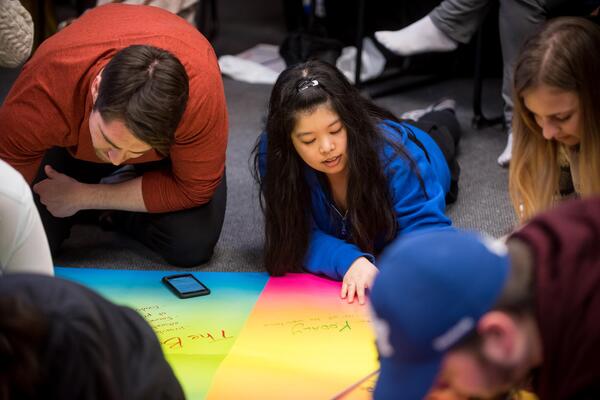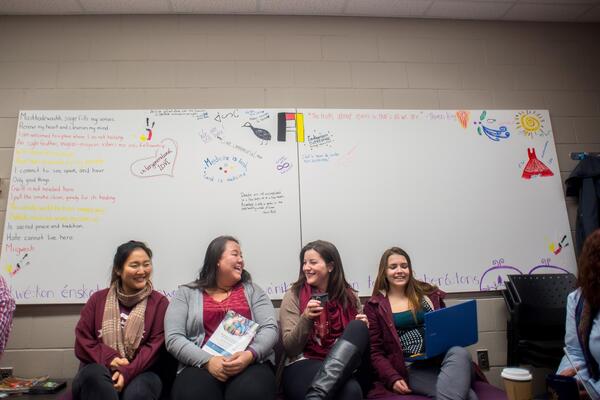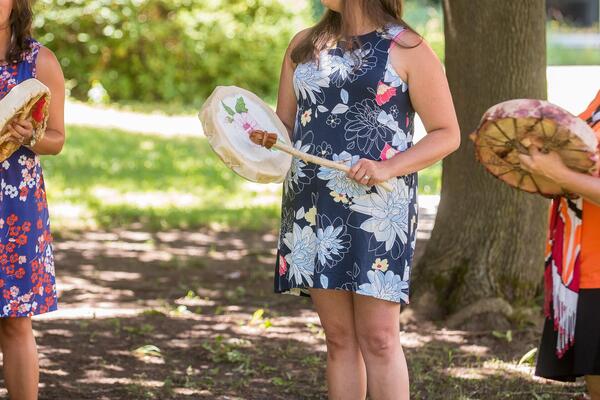The Faculty of Education at Queen’s University “strives to create gathering places where there is room for all to learn, grow, and contribute by building inclusive communities centred on innovative teaching, learning, and research.”
Equity, diversity and inclusion are not only principles but active commitments in the Faculty and at Queen's University. We believe that by fostering an inclusive and equitable academic community, we can enhance the educational experience for all and prepare future leaders in education to address the complex challenges of our diverse world.
On this page you will find information about equity, diversity, inclusion, decolonization, indigenization, and accessibility in the Faculty. This page also includes support for students, faculty, and staff. You can also find contact information to share concerns and learn about our EDID team.
The Faculty of Education strives to provide an accessible and inclusive experience for everyone in our community. Our website content and images are a work in progress. We are actively working on increasing the stories and images to ensure they reflect the diversity of our community. We are available at educcomms@queensu.ca for feedback.
Equity
In the Faculty of Education, our commitment is to ensure equitable treatment, access, opportunities and advancement for all individuals. At Queen’s University, Equity Services plays a crucial role in enhancing inclusivity and fairness in both education and employment. Operating under the auspices of the Human Rights and Equity Office (HREO), Equity Services aims to improve educational and employment inclusivity and fairness. Under the banner of the HREO, they provide training and education about equity issues.

Diversity
The Faculty of Education embraces diversity, and our ongoing commitment is to create accessible, safe, and inclusive environments where every individual feels valued and welcomed.
For teachers and teacher candidates we have a host of resources that focus on gender and sexual diversity.
Resources are also available through the Human Rights and Equity Office that explore Sexual Gender and Diversity.

Inclusion
Our aim is to cultivate an environment within the Faculty where everyone feels included. To further this goal, we are actively engaged in supporting various student, faculty, and staff groups dedicated to promoting inclusivity and fostering a sense of belonging for all. You can also learn more about the broader Inclusive Queen’s community.
Decolonization
In the context of Queen’s University, Decolonization is a multifaceted process that involves restoring Indigenous practices, languages and connections to traditional ways of life. It also encompasses acknowledging the historical and ongoing experiences perpetuating colonial power structures. The Faculty of Education is working with Indigenous communities to provide teacher education and working to provide resources that explore the histories of colonialism in schools.

Indigenization
At Queen’s University, Indigenization is the re-doing or reaffirming of education to include Indigenous ways of knowing, thinking, feeling and being. Learn more about Indigenous Relations at the Faculty of Education and the work of our Elder-in-Residence which includes supporting students in our Indigenous Education programs.
First Nations, Inuit, and Métis students can also access Four Directions Student Centre - a home away from home for Indigenous students on campus.

Accessibility
Accessibility is a shared responsibility of everyone in the Queen's community. The Faculty of Education is committed to improving access in our physical and other spaces. Learn more about accessibility initiatives on the Accessibility Hub.
You can also explore disability teaching resources recommended by our faculty and students.

Anti-Racism
The Faculty is dedicated to addressing systemic oppression at Queen's through SHARE.
Faculty members at the Faculty of Education compiled a list of anti-racism resources for educators that can be found online. The Faculty also hosts a larger list of anti-racism resources with input from our students, faculty, and alumni.
The Human Rights and Equity Office also provides anti-racism resources including courses from their training catalogue.
Students
We want our students to feel they belong here. And we aim to support that through groups, resources, and policies.
Gender and Sexualities Alliance
Queen’s Faculty of Education GSA (Gender and Sexualities Alliance) is a group facilitated by Education faculty members, graduate students, and teacher candidates. The group provides a space for sharing and community by hosting social events, as well as supporting community initiatives.
Teacher Candidates of Colour promotes inclusive, diverse teaching and safe spaces throughout the campus.
Yellow House is a comfortable and accountable space for students who identify as Queer, Trans, Black, Indigenous, and as Persons of Colour (QTBIPoC)
Four Directions Student Centre
A home away from home for First Nations, Inuit, and Métis students.
Supports
Learn about supports for Transgender and/or Gender-Nonconforming Teacher Candidates and supports for Teacher Candidates on Practicum
Faculty & Staff
Queen's University strives for a diverse workforce with equitable and fair employment systems. You can learn more about Employment Equity from the Human Rights and Equity Office.
Employees can access Employee Resource Groups focused on a variety of areas:
- Indigenous Staff and Faculty Network
- Queen's University Association for Queer Employees (QUAQE)
- Queen's Muslim Inclusion Network (QUMIN)
- Queen's Women's Network
- Women in Science at Queen's
A Guide for Inclusive Teaching
This guide is part of the Faculty of Education’s ongoing initiatives to bolster equity, diversity and inclusion in classrooms and academic settings.
In higher education: fostering equity, diversity, and inclusion in teaching requires a dedication to establishing a learning environment that is non-discriminatory, accessible, and inviting to every student, irrespective of their background, identity, or circumstances. This commitment involves implementing practices and strategies that foster equal opportunities, incorporate diverse perspectives, and ensure the academic flourishing of each student.
A Guide for Inclusive TeachingEquity, Diversity, Inclusion, and Decolonization (EDID) Terminology Guide
This terminology guide is part of the Faculty of Education’s ongoing initiatives to promote equity, diversity, and inclusion in classrooms and academic settings. It explains concepts related to equity, diversity, inclusion, accessibility, decolonization, and indigeneity in educational settings and encourages the use of inclusive language in personal and professional life. Plain text version of the EDID Terminology Guide is available.
EDI in Research Resources
This resource guide offers a list of Equity, Diversity, and Inclusion (EDI) resources for researchers in the Faculty of Education. These resources are designed to assist researchers in integrating EDI principles into their work, promoting inclusive practices, and tackling systemic barriers within the research ecosystem.
A plain text version of the EDI in Research Resources is available.
EDI in Research ResourcesEquity, Diversity, Inclusion, and Decolonization Committee
The Equity, Diversity, Inclusion, and Decolonization (EDID) Committee was established in the fall of 2019.
The purpose of the EDID Committee at the Faculty of Education is to cultivate an inclusive community; create welcoming classrooms and social spaces for all students, faculty, and staff; ensure equitable and inclusive policies, processes, curriculum, and events; and support marketing, recruitment, and retention initiatives that enhance a diverse teaching and learning community at the Faculty. Read the EDID Committee's Terms of Reference and the full Vision Statement.
Questions or Concerns about EDID?
Read educators' frequently asked questions, answered by Dr. Alana Butler, the Faculty of Education's EDID Faculty Lead
The EDID Committee is available to receive concerns in writing by email for issues that are systemic in nature. You can also bring concerns to the EDID Committee anonymously.
Transgender and/or Gender-Nonconforming Teacher Candidates Frequently Asked Questions.
I-EDIAA
The Human Rights and Equity Office has chosen to adopt I-EDIAA in response to the expressed needs of equity deserving communities at Queen’s.
The acronym stands for Indigenization-Equity, Diversity, Inclusion, Accessibility, and Anti-Racism.
The first “I”, for “Indigenization”, is separated from EDIAA with a hyphen to foreground responsibilities to honour obligations to Indigenous communities which are separate and distinct from equity and inclusion efforts. The first “A” is meant to address ongoing and longstanding community concerns about the persistent invisibility of disabled people and voices. Anti-racism was included in the acronym in acknowledgement of our institution’s uniquely stark history of white supremacy and racism.